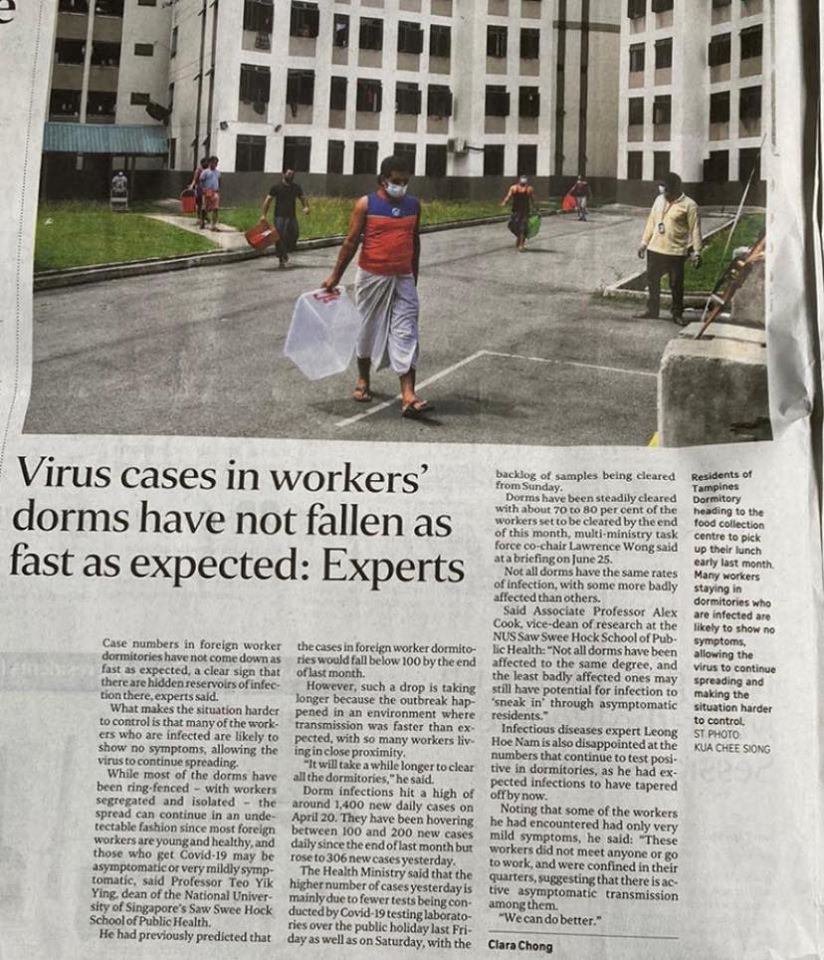Singapore—Migrants’ rights activits Kokila Annamalai wrote in a Facebook post on Wednesday (July 15) that she has seen continued calls for Manpower Minister Josephine Teo to step down due to allegations of poor management at the dormitories of migrant workers, where the vast majority of the Covid-19 cases in Singapore have concentrated.
However, for Ms Annamalai, this is not at the heart of the matter. She writes, “While I have been hugely disappointed by her response, the bigger question, which many migrant workers have raised, is why we’ve set up a system where every aspect of migrant workers’ lives falls under the Minister for Manpower.”
https://www.facebook.com/kokila.annamalai/posts/10164317908740085
Additionally, as this is a public health crisis and given that there have been outbreaks of viral infections in workers’ dormitories in the past years, she asks whether or not the Ministry of Health is to be held responsible. She also asked if MOH’s pandemic preparedness teams did scenario planning that included foreign workers and whether or not the ministry devoted resources to looking into dormitory conditions and the prevention of outbreaks.
Ms. Annamalai added that foreigners who come to Singapore to work must be seen as “more than labor.”
“To treat them as ‘buffer’ for Singaporean job losses, as our Ministers have repeatedly said, is stunningly dehumanizing. MOH, MSF, MCCY, MND, and other Ministries should include all residents of Singapore in their research, policy development, programs, and schemes to ensure that we’re looking after everyone who lives here.”
The activist’s post followed another one wherein she posted a photo of an article from The Straits Times from Tuesday (July 14) entitled “Virus cases in workers’ dorms have not fallen as fast as expected: Experts.”
https://www.facebook.com/photo.php?fbid=10164317736970085&set=a.10154442386575085&type=3&theater
The article cited the dean of the National University of Singapore’s Saw Swee Hock School of Public Health, Professor Teo Yik Ying, as saying that Covid-19 can still spread undetected among the young and healthy workers, who may end up being asymptomatic or mildly symptomatic. Prof Teo had predicted earlier that the number of cases in the dorms would fall to below 100 by the end of June, but the decrease in cases is not happening as quickly as expected since so many workers are living in such close proximity.
Another infectious disease expert, Leong Hoe Nam, was also quoted in the article as being “disappointed” at the number of positive infections in the dormitories since he too had thought they would go lower. “These workers did not meet anyone or go to work and were confined in their quarters, suggesting that there is active asymptomatic transmission among them. We can do better.”
Commenting on the article, Ms. Annamalai expressed her concern over the well-being of the migrant workers.
“Some of these workers have been in lockdown since the first week of April. We’re nearing the end of July. That’s four months in lockdown for the dorms that haven’t been cleared. The persistence of hundreds of cases in dorms means that more workers are at continued, imminent risk of infection, and also that there’s no clear end in sight to their lockdown.
Workers were already expressing signs of distress and despair from lockdown conditions within the first few weeks.” —/TISG
Read also: Josephine Teo’s says “I am not that important,” netizens react negatively
Jolovan Wham apologises to Manpower Minister for corruption allegations

